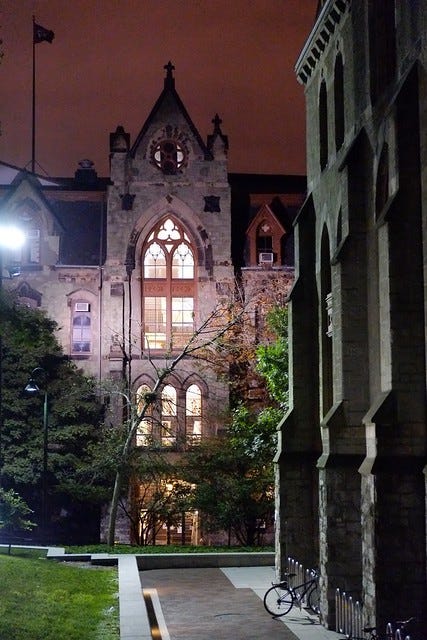Corporate Life and the Life of the Mind

This essay is based on a talk on "Corporate Life and the Life of the Mind" that I gave at the Department of English at Princeton University on 29 January 1999. My thanks to Elaine Showalter for her kind invitation to speak to her graduate students, and to my audience for their feedback and criticism.
These days there's a whole literature on post-academic work, so this is now somewhat dated; I also wrote it well before I started writing trade press books. But it's a piece I reference in several other posts, so for historical / archival reasons if no other, it's worth reposting.
Introduction
For the last decade, in defiance of the rosy predictions made in the early 1980s, the academic job market has been terrible. Recently, a few people have started to discuss what non-academic opportunities humanities and social science Ph.D.s can make for themselves-- what kinds of careers they can enter, what they have to offer, and whether the non-academic life is worth living. Enterprises like the Woodrow Wilson Foundation's "Unleashing the Humanities: The Doctorate Beyond the Academy" program, which seeks to build bridges between Ph.D.s and graduate programs on one side, and the corporate world on the other, are valuable for a number of reasons. They demonstrate to young humanities Ph.D.s that that they have specific, tangible skills that make them attractive in the wider world. They help counter the belief (both among graduate students and their faculty advisors) that nonacademic careers are dismal, lower-grade alternatives to tenure-track jobs. And they bring a pragmatism and optimism to discourse about post-academic careers (to use one recent term) that is very welcome.
Still, some young, intellectually ambitious Ph.D.s might be unmoved by these efforts. These rescue parties, they might think, are necessary for people who aren't really very good scholars, or who come from second- or third-rate programs. In contrast, those few who are born and called to scholarship have no choice but to stick it out. After all, where else but in the university can you conduct research, write articles, open young minds, and build a life based not on material, but mental rewards? Maybe there are too many Ph.D.s. Maybe cost-containment and restructuring have reduced the number of permanent jobs. None of that really matters. For the truly gifted, truly driven, and truly devoted, the ivory tower is the only place to be.

I understand this world-view. I came out of a program that is, in the relatively small field of the history of science, regarded as one of the best in the world. My peers and classmates have tenure at MIT, Johns Hopkins, Cornell, Wisconsin, Michigan, Chapel Hill, and Chicago (among other places). But I want to argue here that this world-view is completely wrong. The life of the mind is something that can be pursued very fruitfully outside the academy. The non-academic world offers the ambitious scholar access to experiences that can enrich their writing; a wider range of venues in which to publish; and greater flexibility to pursue novel or unorthodox projects. More fundamentally, the life of the mind is not dependent on where you are, or what you do. It's more personal, and consequently more portable, than that.
Logistics
Let's begin with something simple: do you have time to write as a non-academic? The vision many of us have of professorial life is one in which one has endless hours to spend pouring over old tomes and papers, flitting from floor to floor of the library, sitting at one's desk as the shadows lengthen, absorbed in the practice of one's craft.
The reality is very different: preparing lectures, grading papers, advising students, writing recommendations, serving on committees, and doing endless applications-- for research grants, travel grants, money for computers, sessions at conferences-- expand to fill the time available. In those departments where junior faculty teach the large survey courses, the amount of time young faculty spend dealing with students is even greater.
As an adjunct professor, your may not have committee work, but you spend that time-- and more-- applying for next year's jobs. As a young professor you don't have as much time to do your own work as you would like; it turns out not to be that different from a 40-hour a week job. In both cases, evenings and weekends are spent catching up on research and writing. As one managing editor of an academic journal told me after reading Journeyman:
I find in my present semi-academic job that I have a fair amount of time for research and writing--almost certainly more that your average assistant prof. I also have more creative energy left over for my own scholarly work after a day of working at [the journal] than I would after a day of teaching. This is not to say my job... is boring; it just uses a different part of my brain than I use for my late-night writing sessions.
Indeed, it's not at all unusual for people in the corporate world to have very serious interests-- musical, artistic, literary, athletic, whatever-- that they pursue after work. The 80-hour week is still an exception in the business world at large. Even in a start-up or investment bank, when you finally go home your life is your own.
Identity
More generally, corporate identity is based far less on formal training, specialty, and publications-- the things that let academics know how to size each other up-- and more on track records working on projects, in departments, etc..
The difference was made abundantly clear by a headhunter I met in Chicago, who helped several friends of mine get jobs in publishing and advertising. As a favor, she did a critique of my resume. The first thing she advised was, get rid of the section listing publications. "Employers want to know who you are, not what you've written," she explained in her rapid-fire way.
It took a few seconds for the penny to drop. In academia, I reflected, what you've written really is who you are. This makes for a greater range of opportunity in the business world for self-invention (and gives the unscrupulous the ability to obscure their failures), and also lowers the bar for Ph.D. newcomers. This gives you a degree of flexibility inside and outside work, which provide opportunities to both continue your established scholarly projects, and pursue new lines of research.

The nature of credentialing is also different in the corporate world. I attended several workshops on how to use various pieces of software, and invariably at the end of each (they generally lasted 1-2 days), everyone in the class got a certificate declaring that they had been through this rigorous course (it wasn't), and we were all now expert users in Complex Software Suite X or Enterprise Networking Package Y (we weren't).
It seemed absurd to me, but also cool: after having only gotten three pieces of paper in 11 years, getting a couple a week was a nice change.
Research and Writing Opportunities
Academic conventional wisdom holds that its members have the freedom to pursue their own intellectual agenda and publish without regard for public opinion. The reality is more complex. Certainly as an academic you have more autonomy to select subjects than you do as a journalist or marketing executive, but the pressures of scholarly fashion are considerable, and no intelligent young scholar is going to ignore them when crafting research projects and writing books.
Likewise, the venues in which you can publish that work, and win tenure and promotion, are severely limited. Scholarly articles in peer-reviewed journals, and books in university presses-- 30-page articles and 300-page monographs-- are the basic units of authorial production, and the only things that are taken seriously. Op-ed pieces, newspaper columns, multimedia projects, literary essays, even articles in highbrow magazines like The New Yorker, can actually count against you.

As a non-academic, you have a greater intellectual freedom to take risks, to experiment with novel subjects, to ply the writer's craft at a scale different from that of your academic bretheren, and even cross over into different media. You're freer to work on projects that are somewhat unconventional, which don't fit comfortably in any scholarly journal, can't be categorized in a disciplinary framework., and don't even follow the trends of interdisciplinary scholarship. Just as important, you can play with the scale of your work. Lots of interesting ideas and stories can be presented in 1000-word essays, suitable for publication as op-ed pieces or essay reviews, or short books.
This is not confined to the sciences. In his excellent book Making PCR, Paul Rabinow reports that some molecular biologists were attracted to biotech startups by an environment more supportive of pure research than academia. University science, these researchers felt, has become a nonstop game of grant-writing, form-filling, and lobbying; as a result, getting support for a lab, equipment, and postdocs requires months of work. Biotech firms, in contrast, have larger quantities of money and simpler procedures for getting new projects funded, leaving more time for doing real science.
Ironically, the current drive in university presses to make their lists more appealing to the general public may work to support these experimental efforts.
Professional Visibility
Being a productive scholar and a professional outsider confers distinctiveness within scholarly circles.
About a year into my tenure at Encyclopaedia Britannica, I was invited to serve on the History of Science Society's Committee on Publications. They decided they needed someone with some knowledge of electronic publishing, and my combination of academic training and technical experience suddenly made me attractive to the field in a way I hadn't been before. Had I been just another assistant professor, there was no way I could have gotten onto this committee so quickly, and started being involved in the affairs of HSS. (That same mix eventually brought me to the attention of the Stanford Library, and the job I now occupy.) More recently, that experience living both the vita contemplativa and the vita activa has won me a term on the editorial board of American Scholar, the journal of Phi Beta Kappa.
My experience can be replicated in any number of ways. If you develop skills in budget management or project planning, for example, you could apply those to helping your discipline's society make sense of its books; since few academics know even basic accounting, and many are math-phobic, you could quickly become invaluable. Likewise, every society engages in a certain amount of advertising and publicity; what distingishes those efforts from those of real advertising agencies, on the average, is how poorly they're conducted. Someone with experience in advertising could make a big impact on a fundraising drive, or a membership or subscriptions campaign.
The examples could be multiplied, but the underlying rule is this: Professional and scholarly societies are organizations that need can benefit from the knowledge that people working in the business world possess. Being in possession of that knowledge allows you carve out a niche for yourself in the scholarly world, and attain a precocious level of visibility.



